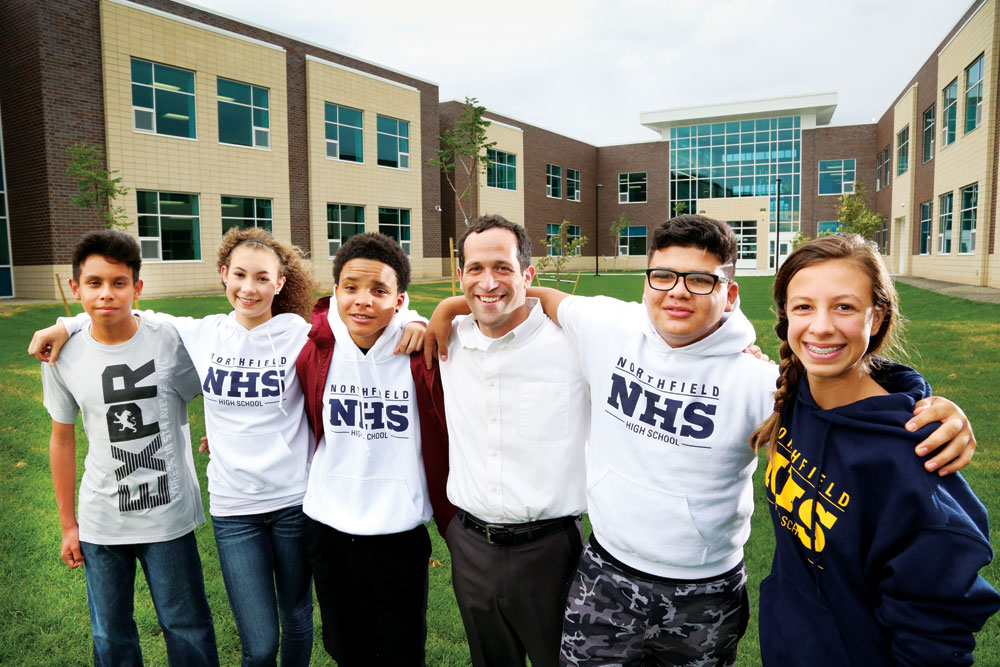
Principal Avi Tropper (middle) joins members of the first class at Northfield High School at their new campus. Left to right: Humberto Velez, Macy Gosch, Devante Tangur, Chris Villa and Sofi Spratt.
The first new Denver Public Schools comprehensive high school to be built in 35 years is not just a new state-of-the-art building; in many ways Northfield High School (NHS) is a new approach to education that reflects current thinking and research in the field.
When Stapleton and Park Hill middle school boundaries combined DPS superintendent Tom Boasberg noted that where a smaller boundary school may be filled with students who are alike in many ways, a larger boundary is more likely to reflect the diversity of the city as a whole. In keeping with their mission to provide quality schools for all, the DPS Board approved a plan for Northfield High School (NHS) that committed not just to provide a seat at the new school for all in-boundary high school students (Stapleton and eastern Park Hill), they committed at least 35 percent of the seats to students in far northeast Denver. As it turned out, NHS, located in a not-very-diverse neighborhood, has the distinction of being the most diverse high school in the city. The school’s first class, about 220 students, is composed of about 30% each black, white and Hispanic, 8% mixed race and 2% Asian and Native American, says Principal Avi Tropper.
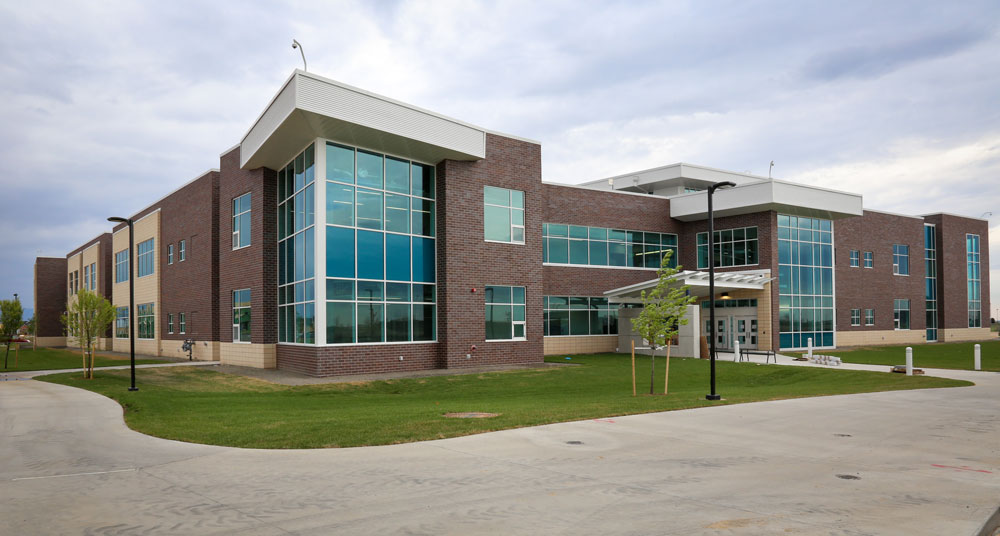
The U-shaped NHS academic building has 37 classrooms on two floors. The building will officially open to the first class of students on August 10.
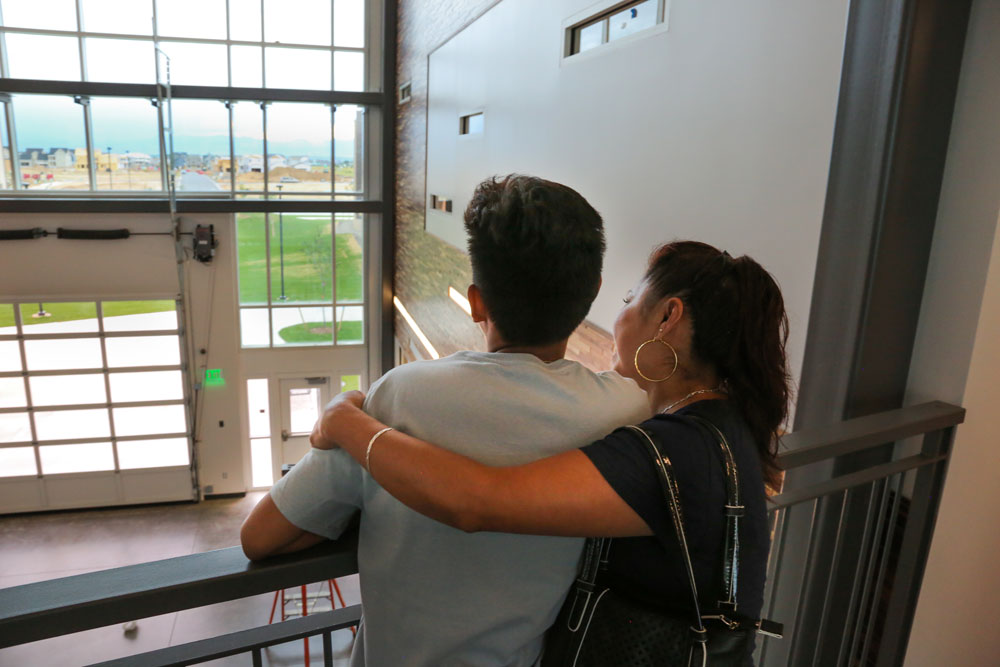
Humberto Velez gets a hug from his mother, Rose Garcia, as they get their first look at the view from the west end of the building.
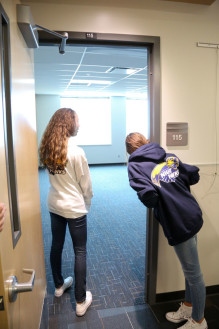
Macy Gosch (left) and Sofi Spratt check out a classroom.
Northfield High School’s teachers are all experienced, averaging 11.7 years teaching—and he has hired adjunct faculty to teach Mandarin Chinese, French, Theatre, Studio Arts and Music. The curriculum for all students is based on the International Baccalaureate (IB) program.
Teenagers (and their parents), looking for what they think of as “a traditional comprehensive high school experience,” have found some innovative approaches at NHS that don’t track with what they have come to expect. The Front Porch asked Principal Avi Tropper and some of his teachers to talk about how these innovative approaches will work.
Positive Psychology
Positive Psychology is the philosophy that underlies all staff-student interactions at NHS. It focuses on effort and practice to improve skills. Tropper says, “We never want to see a coach (or teacher) tell a student, ‘You’re just not good at this.’ We would say, ‘Here are two areas where you can improve. Let’s develop a plan that will allow you to be successful.’ Research shows that approach, whether with athletes or in the classroom, conveys the idea, ‘With effort, support and focus, I can get better,’ and that has tremendous positive outcomes for student success.”
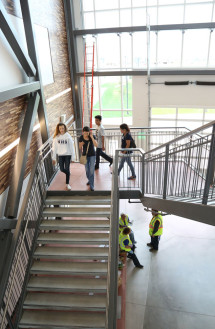
Students on a tour descend the main stairs in the classroom building.
Athletics
NHS has the limitations of any new school with only one grade of students—they simply can’t field multiple levels of teams. But even with a freshman-only campus, Tropper has hired coaches for five fall sports: football, volleyball, softball, cross-country and soccer.
Although no one questions that academics are the first priority, among those who are strongly invested in sports, there is skepticism about changing the traditional high school sports model. What’s different about the NHS sports program?
- NHS athletes have to maintain a higher grade point average than the Colorado High School Athletic Association (CHSAA) minimum (B- rather than C).
- Tropper directly oversees the coaches to ensure that his Positive Psychology approach to developing character strengths extends to the sports field.
- NHS’ Operations Coordinator/Athletic Director, Judy Casco, lettered in four varsity-level sports in high school (softball, basketball, track and volleyball) and has participated in parent groups supporting high school wrestling, football and baseball teams (including a football team that won state multiple times). She also has 20 years of experience in purchasing, accounting and human resources. Casco schedules games, provides logistical and compliance support to coaches, and assists in coaches’ interviews and decisions on hiring.
- Tropper has hired five certified athletic trainers, one for each fall sport, who will run a mid-day conditioning program for each team (and other students who choose that conditioning class for PE). This mid-day PE period gets all students up and moving to “recharge their brain” before afternoon classes. Other mid-day PE options include a yoga/dance class and karate.
- After-school practices with coaches will be 1- to 1½-hour sessions working on skills and game strategies, with the conditioning already covered in the mid-day PE class.
- Backed by research that has shown teens learn best and stay emotionally and physically healthy when they are able to sleep later, Northfield High School’s day begins at 8:45am and ends at 4:45pm. Tropper says they have been able to schedule all their games with minimal classes missed, despite being on a later schedule than other schools.
Advisors
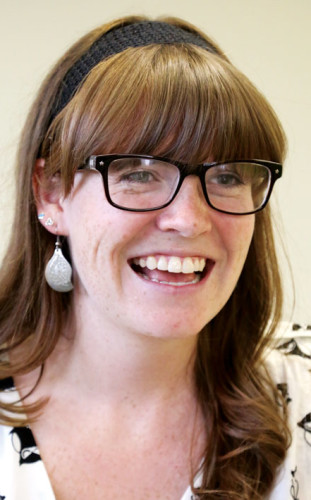
Jamie Doak, Advisor
Tropper has developed a model that he believes will enable his advisors to get better acquainted with students and better meet their counseling/advising needs than the traditional guidance counselor model.
NHS has three advisors for the incoming class of approximately 220 students (a ratio of 73 to one). The advisors will have half-day teaching assignments that enable them to see their assigned students in the classroom every other day throughout the entire four years. By seeing students regularly in the classroom for four years, as well as individually as needed, advisors are able to identify personal, family or academic issues early and help students manage or resolve those issues so they can successfully complete their work. The advisory classes are both an integral part of the IB curriculum and they address the social-emotional side of being a successful student and a successful human being.
“The DPS ratio of students per counselor for DPS high schools is 275 to one,” according to Will Jones, DPS director of media relations. He also confirmed that the overall ratio for the entire district, based on 87,622 students, is 811 students per counselor.
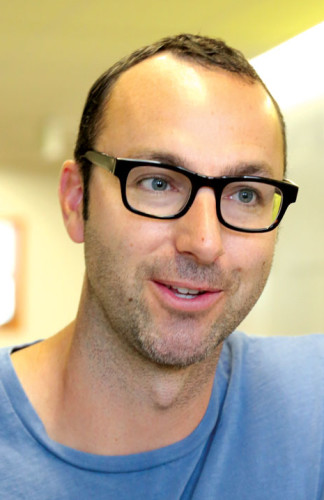
Brent Stickrath, Science
Jamie Doak, one of the three advisors, was a teacher before she went to graduate school for a degree in clinical mental health counseling. “The reason why I think the NHS approach is really cool is because as a teacher, you get to see the kids every day. You get to see them in a social habitat, where they’re interacting with each other … you get a really holistic picture of that student as a person. Sometimes counseling can feel really artificial in that you’re only seeing a kid one hour a week in an office, a very sterilized setting. A lot of what you’re going off of is self-report from the student or a report from their teachers or parents. I think being a teacher and being able to interact with those kids in an academic setting makes me a more effective counselor because I know what’s going on and I’m more integrated into the student’s life.”
Inclusive Classes
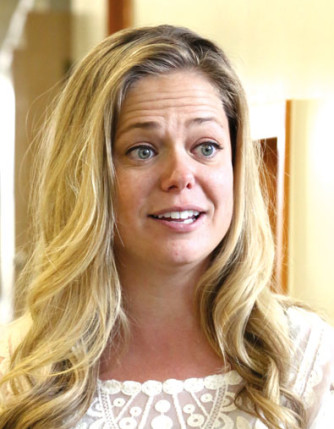
Katie Langlois, Literature
As part of their inclusive approach to classes (no separate honors-level classes), NHS has set up a program and schedule that allows students to get additional support, if needed, to meet the standards in their classes. The program also allows students to take on more challenging tasks to get an honors designation on their transcripts and/or take more elective classes. Tropper says inclusive classrooms recognize that students have different strengths and that all students can be successful if they put in effort and get the support they need to be successful.
Competency-Based Learning
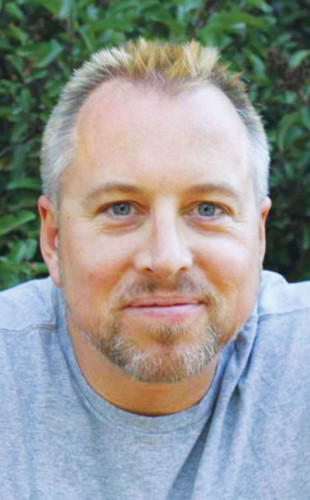
Joe Gill, Theatre
Science teacher Brent Stickrath, who is an experienced teacher in the use of competency-based learning, says students know when they enter the class exactly what’s expected from them when they leave the class. “When you make it clear, there’s nothing holding them back. They don’t need to wait for me, as a teacher, to move ahead. In other words, we’re not taking the top kid in the class and saying, ‘Stop and wait for everybody else,’ and we’re not taking the kid that’s struggling the most in class and saying, ‘Hurry up.’ We’re meeting each of them where they are and passing them through these competencies, giving them the support that they need.”
Stickrath makes assignments available online and, when possible, provides video tutorials for students who are struggling so that they can rewind and re-watch segments. Also, he says, paying attention to content and processing information while taking notes may be difficult for a student who is a bit behind, so he can provide a copy of the notes for students as necessary. He also has materials ready for the students who are ready to move forward faster.
Collaborative Teaching
Literature teacher Katie Langlois is excited about the collaborative teaching model at NHS. “If you have to collaboratively plan with other teachers, you can’t go into a class and have a rough idea of what you’re doing. Sometimes you just have an idea, and you’re like, oh, yeah, I know exactly how this is going to work. Then you collaborate with someone, and they’re like, well, what about this detail? What about that detail? You have someone else asking questions and thinking about things that you might not otherwise think about. I would never go back to teaching where I wasn’t collaborating with other teachers.
Academic “Pathways”
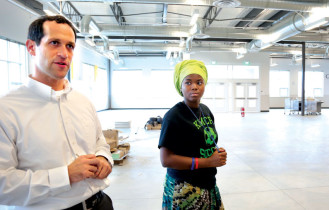
The official cafeteria won’t be built until fall 2016, but the bright, spacious temporary cafeteria looks and feels more final than temporary.
The opportunity to participate in a wide range of classes, electives, and after-school programs is seen by many as one of the great strengths of a large comprehensive high school. Students can try out a variety of options and change their minds from year to year (or even semester to semester).
Northfield, as an IB school, has set up a more focused approach to electives that prepares students for the IB exams (and college credit for successful completion of the exams). Students select one or two areas of interest (pathways) and take four years of classes in those areas. Tropper believes and research shows students benefit when they select an area of passion and interest and explore it in depth. “We know it’s definitely something colleges are looking for to see students are able to persist and pursue something they’re interested in and successfully complete it over a long time period.”
Northfield’s eight pathway options are: Economics & Business, Politics & Law, Visual Arts, Music, Theatre, Biomedical Science, Engineering, and Computer Science. Students are also able to take special week-long interdisciplinary courses twice a year on topics such as mass incarceration, world religions, feminism and pop culture, and creative writing.
Theatre teacher Joe Gill says it’s his job to get students ready for the tests theatre students have to take for the IB Program. “One of the tests is to create a director’s book, which is really how they would direct a show—as well as put together a show that they create themselves. They will literally learn how to write, direct and produce the entire show, as well as also do other tests about different genres of theatre around the world.”
Gill also wants to form an after-school drama club that will include both theatre students and any other students who want to participate and put on a performance. He has done multimedia theatre with projections, light and sound and he has done a show using cellphones for everything—cellphones that created the light; cellphones used as speakers. “There are many different ways to play around with different technologies,” Gill says.
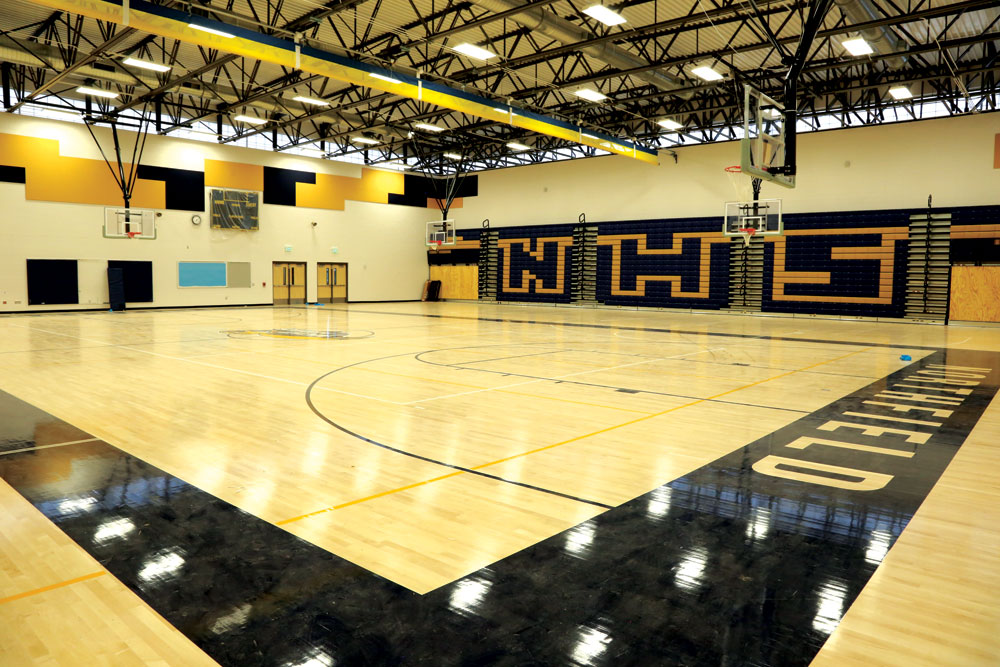
The new gym is ready for its first game.
Dress Code
According to the DPS communications office, 59 high school and middle schools have a dress code. Though having a dress code is something most students, at least initially, don’t ask for or appreciate, Tropper and his staff believe it’s necessary to create a respectful, motivational and professional learning environment reflective of the workplace. “As all adults know, every workplace has expectations around dress and we believe it’s important that we have those expectations as well.” Tropper believes the dress code, which allows jeans and sneakers, is loose enough to allow students to express themselves and their personality.




No real athletic director…and a principal who is experimenting….i wonder how it’s going there? A principal setting athletic practice times…..this is a joke!!##
Congratulations Avi! You have worked hard to build this school on solid values and standards to provide unique educational opportunities for all your students. I especially enjoyed the videos that highlight the development of the project and school overtime. After knowing your work ethic, passion for education and love to creating impactful change for children, I am glad your goals have been realized. Congrats again Tropper! Best, Harlem Williams
What the heck. This type of teaching and learning does not work. Children are not one size fits all. What about a quality education at high levels. Calculus. Trig.
This is frightening! Children have the to their own education not a collaborative approach that pulls everyone to the same level. Parents do not buy into this. This is a social experiment and they are using your child’s education as the the experiment.
Awesome top-dollar space and architecture, gets sick light and air. Plans of study, etc, sound exciting. Principal Tropper sounds hard-core but I can take it. This makes me wanna go back to high school. Lol.